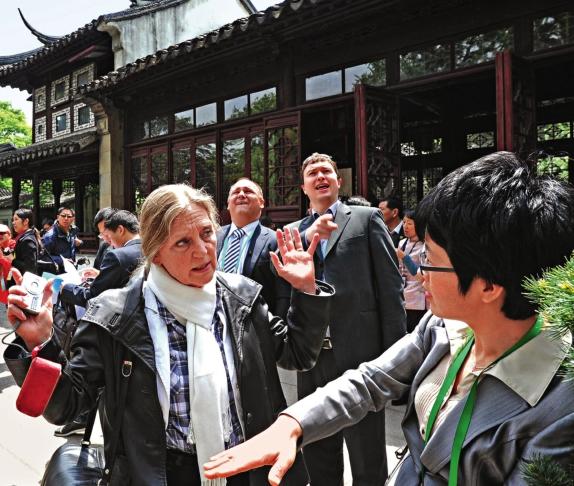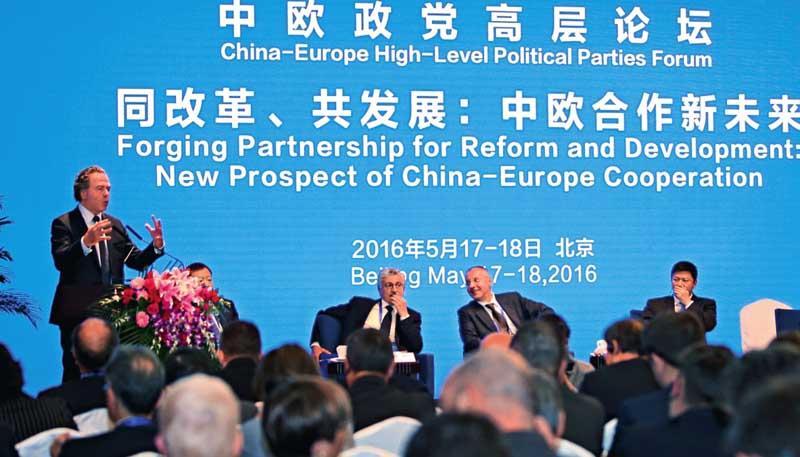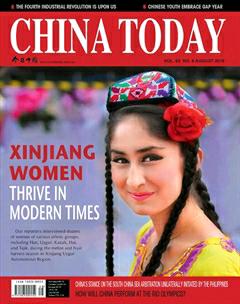High-level Political Parties Forum Galvanizes China-Europe Cooperation
By KONG GENHONG


THE Fifth China-Europe High-level Political Parties Forum concluded on May 18 in Beijing. Since its inauguration in 2010, the forum has held five sessions, the themes of which were:“Forging Partnership for Reform and Development, New Prospect of China-Europe Cooperation,” “Promoting Win-Win Cooperation for New Breakthroughs in ChinaEurope Relations,” “China and Europe Cooperate to Meet Challenges,” “Chinas 12th Five-Year Plan and Europe 2020 Strategy: New Opportunities and Prospects for China-Europe Cooperation,” and “Global Challenges and China-European Cooperation.”
Interparty relations are an important facet of ChinaEurope relations. The China-Europe High-level Political Parties Forum is a top-level platform for multilateral and strategic consultations. On the basis of equality, inclusiveness and mutual respect, party leaders, politicians and scholars from China and Europe have held dialogues at the forum over the past six years. They have reached consensus on key issues such as how the two sides view each other and how to understand and propel China-Europe relations, thus enhancing mutual trust and injecting new dynamism into the overall China-Europe strategic partnership. Therefore, the forum has played a distinctive part in promoting the healthy and stable development of the China-Europe comprehensive strategic partnership.
Exchange Governance Experience
The forum covers a wide range of topics and one of its key components is the exchange of governance experience.
Political parties in China and Europe differ institutionally and ideologically, but both sides value exchanging experiences in governance and reciprocal learning. In todays world, competition among countries comprehensive national strength constitutes to a large extent the competitive capability of their ruling parties. In fact, all political parties confront similar issues, like how to boost economic development, improve peoples livelihoods and build a harmonious and stable society. As the ruling party of the largest developing country in the world, the Communist Party of China (CPC) studies the governance experience of other political parties around the world under the background of global socio-economic development. The Party is keen to absorb the cultural essence created by people around the world by systematically researching the governance concepts, governance institutions, governance mode, and governance laws of the ruling parties around the world, including those in Europe. It is of crucial significance that the CPC improves its capability and consolidates its status as a ruling party. Moreover, with Chinas rapid development, the political parties in European countries are also paying heed to Chinas style of governance. At the China-Europe High-level Political Parties Forum, representatives of the CPC and dozens of political parties in Europe launched open discussions on state governance issues and challenges, and held dialogues on party building. Most participants at the forum were from ruling parties, or parties currently not in power, but with rich experience in governance that could benefit the CPC.
The CPC advocates holding the China-Europe Highlevel Political Parties Forum to enhance mutual learning and exchange experiences with parties in Europe in terms of development concepts and state governance. It is a new measure through which the CPC can maintain its advanced nature and build itself into an innovative, serviceand study-oriented party. The forum also embodies the resolution of political parties in China and Europe to rise above differences in ideology and seek mutual understanding and cooperation. In the past more than 90 years of development, the crucial reason for the CPCs success has been its learning adeptness.
Promote Pragmatic Cooperation
Economic complementarity and interest blending is the solid foundation for the comprehensive China-Europe strategic partnership. To jointly cope with global challenges and build a global governance system is the new connotation of the multi-level China-Europe comprehensive strategic partnership. Political parties are expected to use their resources to build channels to promote China-Europe pragmatic cooperation at different levels in furtherance of common interests. Parties in both China and Europe believe that Chinas economic transformation and Europes economic and social development have opened up greater scope and opportunities for cooperation. The word most frequently recurring during the past few forums has been “cooperation.” Both sides have discussed concrete plans to strengthen cooperation in fields such as finance, trade, investment and the opening up of markets, as well as exchanging experience and concepts in terms of economic and social development.
The Fifth China-Europe High-level Political Parties Forum that convened in May 2016 consisted of two parts– a forum and an economic and trade dialogue. The latter was held in Zhengzhou City of Henan Province, with the theme of promoting pragmatic cooperation between local governments in China and countries in Europe under the framework of the Belt and Road Initiative. More than 40 delegates from political parties in over 20 European countries, and representatives of regional parties in Europe and political groups within the European Parliament attended the economic and trade dialogue. Yanaki Stoilov, deputy-speaker of the National Assembly of the Republic of Bulgaria and vice-president of the Bulgarian Socialist Party, said that, under the Belt and Road Initiative, China and Europe can seek opportunities at not only national level, but also at local level. He said efforts could be made to encourage Bulgarian companies to participate in relevant Belt and Road Initiative projects to enhance their production capability and seek more business opportunities. Sergei Stanishev, president of the Party of European Socialists and former prime minister of Bulgaria, said he is happy to see Europe launching cooperation with Henan Province, and that he expects the establishment of a framework that can address the current obstacles and concerns of various sides. He believes that the prospects for development would be significantly enhanced if more countries and political parties could join in the Belt and Road Initiative. Francis Wurtz, member of the central committee of the French Communist Party and former president of the European United Left-Nordic Green Left group, said that Henan Province is well-known for its long history and rich culture, and that he would like to share his experience and feelings with his countrymen by visiting China in general and Henan in particular. He believes it is his mission to better introduce China to people back home.
Enhance Mutual Political Trust
China and Europe have different historical back- grounds, cultural traditions and social institutions, and the two are at a different social and economic development stage. Moreover, their political parties have different governance concepts and ideologies. The forum acts as a “relief valve,” through which the political parties in China and Europe can express different opinions and interest claims, reduce contradictions and ease conflicts. The forum also encourages the political parties of both sides to better guide public opinion in China and Europe, and provides constructive suggestions on dealing with divergences and preventing conflicts on the basis of mutual respect. It thus builds a favorable public opinion environment for China-Europe friendship and cooperation.
At the first China-Europe High-level Political Parties Forum, Thierry Mariani of the French Union for a Popular Movement said that it enables foreign political parties direct interaction and dialogue with the CPC, and that such “brainstorming” will eventually promote mutual understanding. Lothar Bisky, chairman of the European Left Party and leader of the Confederal Group of the European United Left-Nordic Green Left in the European Parliament, said that although some people dont agree with its basic political concepts, he was impressed by the CPCs rich theories and determination to improve the Chinese peoples livelihood.
At the fifth China-Europe High-level Political Parties Forum, Kent H?rstedt, a Swedish social democratic politician and Chairman of the Friendship Association for China of the Swedish parliament, said that China-Sweden relations have been long-standing and well-established. However, the two sides still know little about each other in certain fields, and he believes such communication via the forum is needed. Francis Wurtz believes that the significance of the forum lies in its promotion of mutual understanding and enhanced friendship. He said that for him it was a quality visit as he witnessed there a dialogue between different civilizations.
The forum serves as a platform for politicians and political parties in China and Europe to communicate directly, thus promoting mutual understanding and fostering mutual trust and friendship, settling divergences and conflicts, creating opportunities to solve thorny issues among countries, and ensuring a favorable public opinion for the development of China-Europe relations.

The CPCs Open Attitude
Leaders of the European political parties that attended the first China-Europe High-level Political Parties Forum generally thought that it embodied the open attitude of its host, the CPC. A delegate from the Spanish Socialist Workers Party observed that the forum itself manifests the CPCs open attitude and that the increasing presence of the CPC in the international arena also signifies that it has become more open and transparent. A leader from the Polish Peoples Party remarked that China and Europe have different political systems. Political parties in Europe represent different interest groups, so it is difficult for them all to participate in state governance. The CPC, as the ruling party in China, has become ever more influential in the world because of its highly efficient governance. Its experience is worthy of learning by European political parties. In fact, the CPCs image has changed from stiff and conservative to vital and more open in international society along with its increasingly active exchanges with foreign political parties. The international community recognizes this shift. Lothar Bisky said that great changes have occurred in both China and the CPC, and that the CPC has now become a study-oriented party capable of dealing with new problems that crop up in the course of development. Sr?an Milié, president of the Socialist Peoples Party of Montenegro, said that he can see the CPC growing ever more open to the outside world, which now has more opportunities to hear Chinas voices.
In the third China-Europe High-level Political Parties Forum, Dick Roche, vice president of the European Liberal Democrat and Reform Party, said that China has successfully achieved social transformation and spectacular results in a short period of time, thus winning trust from its people. He noted that Europeans have long been over-confident and their prejudices against China have impeded bilateral exchanges. He remarked that Europeans should reconsider the problems in their political systems and development mode. China and Europe could enhance cooperation and learn from each other through dialogues and exchanges.

